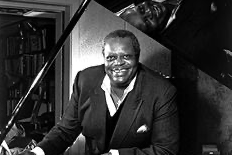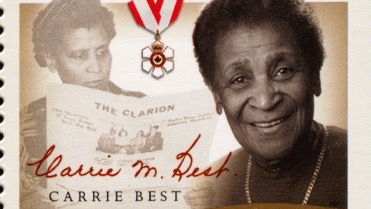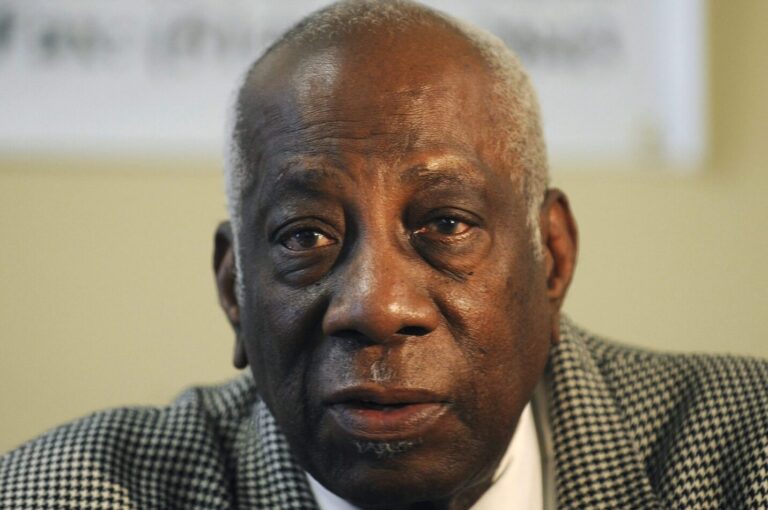
Courtesy Regal Recording Ltd
Peterson’s approach to jazz is full-blown and joyous.
Oscar Emmanuel Peterson (August 15, 1925 – December 23, 2007) was a legendary Canadian jazz pianist and composer, often regarded as one of the greatest jazz pianists of all time. With a career that spanned over six decades, Peterson released more than 200 recordings, earned eight Grammy Awards, and received numerous accolades, including a Grammy Lifetime Achievement Award. His unparalleled contributions to jazz made him an icon in the music world, earning admiration from musicians and fans alike. Jazz great Duke Ellington famously referred to him as the “Maharaja of the keyboard.”
Early Life and Musical Beginnings
Born in Montreal, Quebec, to immigrant parents from the West Indies, Peterson’s early musical education was rooted in classical piano training, taught by his mother and sister. However, it was jazz, particularly boogie-woogie and swing, that captivated his imagination. The vibrant jazz scene in Montreal’s Little Burgundy neighbourhood sparked his passion for the genre. By 14, Peterson had already won a national music competition organized by the Canadian Broadcasting Corporation (CBC). Choosing to pursue his music career full-time, he left high school and began performing in local bands and radio shows.
International Stardom and Iconic Collaborations
Peterson’s international career took off in 1949 when he was introduced to the New York jazz scene by impresario Norman Granz. He formed multiple iconic collaborations, including the legendary Oscar Peterson Trio with bassist Ray Brown and guitarist Herb Ellis. This trio became known for its high-energy performances and timeless recordings such as Night Train (1963) and Canadiana Suite (1964). Peterson’s technical brilliance and improvisational skill were evident in every performance, blending classical influences with jazz and blues traditions.
Throughout the 1950s and 1960s, Peterson collaborated with jazz legends such as Ella Fitzgerald, Count Basie, Herbie Hancock, and Ben Webster. His trio performances were renowned for their creativity, intricate improvisations, and flawless technique.
The 1970s and Beyond: A Continued Musical Evolution
In the 1970s, Peterson formed a new trio with guitarist Joe Pass and bassist Niels-Henning Ørsted Pedersen. Their collaborations won the 1974 Grammy Award for Best Jazz Performance by a Group. His ability to merge classical and jazz influences was highlighted in orchestral recordings such as Yesterday and Eleanor Rigby (1969).
Despite facing health challenges later in life, including arthritis and a stroke in 1993 that affected his mobility and left-hand dexterity, Peterson continued to inspire with his love for music. He performed in a reduced capacity but remained dedicated to mentoring young musicians, including Benny Green, and teaching at the York University jazz program.
A Profound Legacy in Jazz
Peterson’s influence on jazz was transformative. Known for his virtuosic technique, mastery of complex harmonies, and exceptional improvisation skills, he set the benchmark for future generations of pianists. His compositions, including Canadiana Suite, have become integral parts of jazz literature. Peterson’s playing style is often compared to that of the legendary Art Tatum, but his contributions to the genre are uniquely his own.
Peterson’s impact on jazz education was equally significant. He was involved with the Advanced School of Contemporary Music in Toronto, where he nurtured the next generation of jazz musicians. He also received numerous honours, including being made a Companion of the Order of Canada, as well as honorary degrees from various universities.
The Legacy Lives On
Oscar Peterson passed away on December 23, 2007, at the age of 82 in Mississauga, Ontario, due to kidney failure. He was buried at St. Peter’s Anglican Church in Mississauga, where his tombstone honours the life and career of one of the most influential jazz pianists in history. Peterson’s music continues to inspire jazz enthusiasts and musicians around the world, ensuring that his legacy endures for generations to come.
Key Highlights of Oscar Peterson’s Career:
- Over 200 recordings were released.
- Eight Grammy Awards and a Grammy Lifetime Achievement Award.
- Acknowledged by Duke Ellington as the “Maharaja of the keyboard.”
- Formed the influential Oscar Peterson Trio.
- Collaborated with jazz legends like Ella Fitzgerald, Count Basie, and Herbie Hancock.
- Dedicated to teaching and mentoring the next generation of jazz musicians.
Oscar Peterson’s contributions to jazz remain unmatched, and his legacy as a musician, composer, and educator continues to shape the world of music today.



